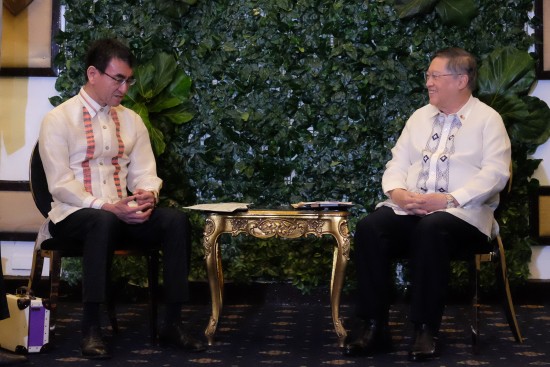
(Eagle News) — Finance Secretary Carlos Dominguez III thanked the government of Japan for its “generous support” in helping jumpstart the Philippines’ ambitious “Build, Build, Build” infrastructure program, citing the nine loan agreements signed since the start of the administration of President Rodrigo Duterte.
Dominguez said the loan agreements with a combined amount of JPY398.82 billion (about $3.63 billion or P189.92 billion) were formalized between the Philippines and Japan since President Duterte assumed the presidency in 2016.
These were for the following projects:
· Maritime Safety Capability Improvement Project for the Philippine Coast Guard (Phase II);
· Harnessing Agribusiness Opportunities through Robust and Vibrant Entrepreneurship Supportive of Peaceful Transformation (HARVEST);
· Cavite Industrial Area Flood Risk Management Project;
· Arterial Road Bypass Project (Phase III) in Bulacan;
· New Bohol Airport Construction and Sustainable Environment Protection Project (II);
· Metro Rail Transit Line 3 Rehabilitation Project;
· Pasig-Marikina River Channel Improvement Project (Phase IV);
· North-South Commuter Railway Extension Project (1st tranche of loan); and
· Metro Manila Subway Project (Phase I), which is the single biggest venture under “Build, Build, Build.”
These agreements were signed between October 2016 and January 2019.
“Let me again thank the people and the Government of Japan for the strong support they have extended to our infrastructure modernization program and for being a steady force in our economic and development journey,” the finance chief said.
Dominguez said these loan agreements demonstrated Japan’s “steadfast commitment” to the “Build, Build, Build” program as well as the Philippines’ other priority initiatives.
He said several of these agreements involving infrastructure projects were processed and approved in a short span of 3 to 4 months, in line with the “fast and sure” approach adopted by both countries.
“This demonstrates our shared commitment to work closely to ensure that the Filipino people get to benefit from these projects at reasonable costs and at the soonest possible time,” said Dominguez at the start of his bilateral meeting with Japan Foreign Minister Tarō Kōno held on the afternoon of February 10 (Sunday) at the Waterfront Insular Hotel in Davao City.
Minister Kōno and Foreign Affairs Secretary Teodoro Locsin Jr. also signed the exchange of notes for the Road Network Development Project in Conflict-Affected Areas in Mindanao.
Dominguez said that over the years, Japan has been the Philippines’ top official development assistance (ODA) partner.
Department of Finance (DOF) data show that Japan is the No. 1 provider of ODA loans totaling US$5.84 billion (47.51 percent of the total)], and the No. 5 provider of ODA grants amounting to US$141.33M (6.28 percent of the total).
He said that since 2017, when the Philippines-Japan Joint Committee on Infrastructure Development and Economic Cooperation was first convened, six high-level meetings were already held to strengthen bilateral cooperation between the two countries.
“With frequent coordination meetings, our accomplishments in the last two years have been unprecedented,” Dominguez said. “We look forward to more productive discussions in the forthcoming seventh high-level meeting to be convened in Osaka, Japan later this month.”
Among the officials present at the meeting between Dominguez and Kōno were Philippine Ambassador to Japan Jose Laurel, Japanese Ambassador to the Philippines Koji Haneda, DOF Undersecretary Mark Dennis Joven and Shigeki Takizaki, the Director-General/Assistant Minister, Southeast and Southwest Asian Affairs of Japan’s Ministry of Foreign Affairs. (with a DOF release)







